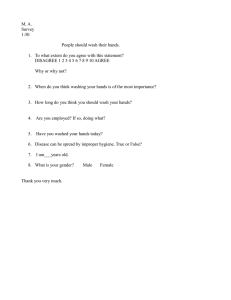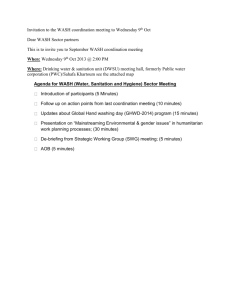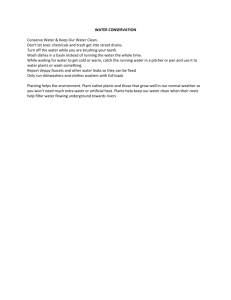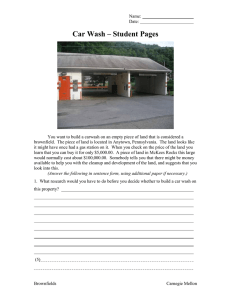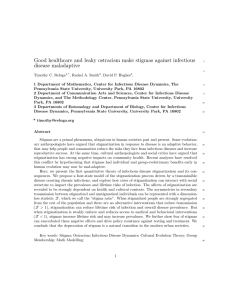Rights to Water and Sanitation Introduction
advertisement
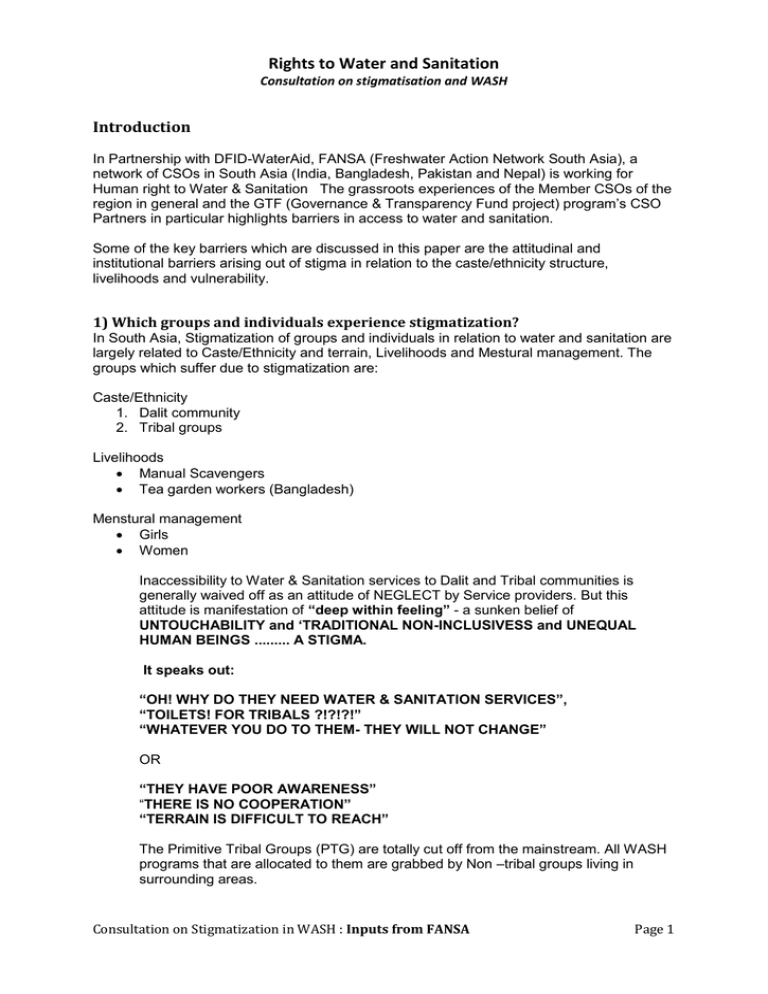
Rights to Water and Sanitation Consultation on stigmatisation and WASH Introduction In Partnership with DFID-WaterAid, FANSA (Freshwater Action Network South Asia), a network of CSOs in South Asia (India, Bangladesh, Pakistan and Nepal) is working for Human right to Water & Sanitation The grassroots experiences of the Member CSOs of the region in general and the GTF (Governance & Transparency Fund project) program’s CSO Partners in particular highlights barriers in access to water and sanitation. Some of the key barriers which are discussed in this paper are the attitudinal and institutional barriers arising out of stigma in relation to the caste/ethnicity structure, livelihoods and vulnerability. 1) Which groups and individuals experience stigmatization? In South Asia, Stigmatization of groups and individuals in relation to water and sanitation are largely related to Caste/Ethnicity and terrain, Livelihoods and Mestural management. The groups which suffer due to stigmatization are: Caste/Ethnicity 1. Dalit community 2. Tribal groups Livelihoods Manual Scavengers Tea garden workers (Bangladesh) Menstural management Girls Women Inaccessibility to Water & Sanitation services to Dalit and Tribal communities is generally waived off as an attitude of NEGLECT by Service providers. But this attitude is manifestation of “deep within feeling” - a sunken belief of UNTOUCHABILITY and ‘TRADITIONAL NON-INCLUSIVESS and UNEQUAL HUMAN BEINGS ......... A STIGMA. It speaks out: “OH! WHY DO THEY NEED WATER & SANITATION SERVICES”, “TOILETS! FOR TRIBALS ?!?!?!” “WHATEVER YOU DO TO THEM- THEY WILL NOT CHANGE” OR “THEY HAVE POOR AWARENESS” “THERE IS NO COOPERATION” “TERRAIN IS DIFFICULT TO REACH” The Primitive Tribal Groups (PTG) are totally cut off from the mainstream. All WASH programs that are allocated to them are grabbed by Non –tribal groups living in surrounding areas. Consultation on Stigmatization in WASH : Inputs from FANSA Page 1 As a matter of their Livelihood of working with filth, Manual scavengers are considered as UNTOUCHABLES and are least considered for any Services. Tea Garden workers in Bangladesh are “OUT OF LOT”- not valued for WASH services, excluded from service provisions - by Tea garden owners and Union Parishad. An institutional Barrier. A STIGMA – they have come for livelihood – have to adapt with whatever WASH conditions. In South Asia, Menstruation is viewed as a stigma due to the value of “Inauspicious” attached to it. It is considered as evil and Girls and women are not allowed to participate in public life. In re;ligious places and functions and also not allowed inside home. Due to this stigma, girls and women undergo psychological deprivation. In atime when they need better care and hygiene, women often are denied of the same. 2) How are different groups and individuals affected? Dalit and Tribal communities, Manual scavengers, Tea Garden workers and Mentural Hygiene are less likely to become focussed in the programmes: Planning, Design, Implementation, Operation & Maintenance and Monitoring. As much as they are not organised and voiceless – they are unable to get their rights channelized. . A ‘Culture of Poverty’ engulf them making them more vulnerable. The well to do or the powerful take benefit of the WASH schemes and services. Instances : Village Sonadhuni, pakur District, Jharkhand : The Hill tribe Paharias are cut off from any development programs of the Government including WASH. They are considered not only socially excluded but are stigmatized – “why do they need any services as they live in the hills. They are cultureless”. It happened that a Water supply schemes was allotted to Sonadhuni village but was diverted to a Non tribal village by an upper caste community in the surrounding area. The tribals had to continue using stream water for drinking Dalit community: “The Drought prone district of Anantapur in Andhra Pradesh, India, suffers severe drinking water scarcity in summer months. The District administration arranges water tankers for supply of drinking water to the acute water shortage villages. These water tankers reach the main village and are largely accessible to OCs (other caste) and BCs (backward caste). But the Dalits, who leave in the colonies outside the main village have to reach with containers and are the last to collect water or sometimes return with empty containers”. Tribal community “Breakdown in Hand pump and lack of safe drinking water source is the common situation in the tribal villages. In these situations, tribals resort to using stream or other unsafe sources for water. Repair of the hand pump takes a much longer time than any non tribal village from weeks to months” Manual Scavengers A large number of people working in contact with “waste” have been not considered by both the government agencies by not including scavengers or municipality workers in the definition of sanitation. When it comes to common removal of human excreta (second or third person shit), in municipality, or common toilets, these voices are not heard. The state does not provide logistics to the scavenging communities; rather it forces them to do the cleaning of “waste” in an unhygienic manner. If the state promotes hygiene among the scavenging occupation, then it implies investment. For Consultation on Stigmatization in WASH : Inputs from FANSA Page 2 example the Dry latrines are still in existence is a revelation that State is still promoting manual scavenging. Though manual scavenging has been eradicated in 1993, still more than one million karmachars are working. The stigma on these scavengers as they say are “people do start behaving differently when they come close to us when I do my work because of my caste” Another person expressed that “people start covering their mouth while talking to them” While yet another person shared that “people do start behaving differently like for example-they do not allow us to have water in their glass”. Tea Garden workers Tea garden owners have agreement with Government (Under Ministry of commerce) and laborers contracted for work. The agreement is hardly followed in spirit. It is hard to reach laborers due to restrictions by Tea garden owners. On the other hand the local administration does not count Tea garden workers as citizens to be part of their jurisdiction. The result speaks: Septic Latrines constructed long times ago by tea garden owners are defunct as they are full and not cleared and Polluted drinking water sources, not safe for human consumption. Menstrual Hygiene A Study on MHM in Andhra Pradesh reveals that Menstruation is per se considered a Stigma for its Unhygienic aspects and therefore resulting in poor attention to the subject: Lack of Sanitation facilities in schools and at home, Not addressing availability and affordability of Sanitary napkins, Disposal of used napkins, 3) How is stigmatization relevant to access to water and sanitation? Stigmatization results in promoting the ‘Culture of Poverty’ – lack of self-esteem, hopelessness and fear. The stigmatized communities continue to suffer lack of or poor WASH facilities resulting in illness and health expenditure, pulling them in a vicious cycle of poverty. Analysis of WASH is generally restricted to physical conditions, institutional arrangements or duty bearer’s attitude. From the lens of Stigmatization, we create a framework of looking at WASH access to marginalized communities/groups – the cause rather than effect. From the stigmatization point of view, we yield a renewed focus on the stigmatized communities/groups and it helps to plan, design, implement and monitor programmes effectively. 4) What measures are being taken to address and overcome stigmatization? Awareness programs: Providing Information and helping stigmatized communities to analyze their situation vis-avis Rights helps build their awareness. In GTF program being implemented through FANSA, partners work with the stigmatized communities to build their awareness through a host of activities like WASH assessments, identifying issues and core causes, options to resolve the issues discussed in Gram sabhas and in VWSC (Village water & sanitation Committee) meetings. Growing awareness is reflected in their plans, actions and reports. The subject of menstrual Hygiene management is being pushed at Policy level for supply of sanitary napkins in schools and facilities. Consultation on Stigmatization in WASH : Inputs from FANSA Page 3 Menstrual Hygiene Management (MHM): Education of Girls on Reproductive health in schools, promotion of sanitary napkins and school sanitation facilities are the core measures being promoted. Advocacy actions are taken up with Government department to supply sanitary napkins to schools and provide WASH facilities. Demand and Follow up: In GTF program, it is being ensured that WASH plans are made for PTGs (Primitive Tribal Groups) and are strictly implemented. The PTG Paharia community demanded and pressurized the Local Government for Water supply scheme and followed it up to get the same implemented. Eradication of Manual Scavenging Demolition of Dry latrines: In villages wherever Dry latrines are in use, actions are being taken through Government for demolition of the same. Suits filed on owners: wherever scavengers are engaged to lift the filth. Advocacy: Advocacy actions for rehabilitation of Manual scavengers. TOOLS & STRATEGIES: Many tools and strategies are worked out in GTF program to demand WASH rights and influence design and implementation of WASH programs: RTI: Right to Information Act is being fully utilised as a tool to seek official information regarding WASH programs and investments by which alerting the service providers to deliver. Social Audit: Social audit is a tool used to unearth program investments spending. It is used by GTF communities to learn if the spending happened as per the plan. Interface meetings: Meetings with concerned Government officials are organized to share the concerns and issues in WASH services and seek response for corrective measures. Interface meetings are used for follow up of the decisions. Representations: Representation of demands by the communities in weekly darbars and other Government forums and their follow up. For more/detailed Information : VENKATESH ARALIKATTY Regional Coordinator (GTF-FANSA)-South Asia Region Freshwater Action Network South Asia (FANSA) H.No: 2-127/4 (First floor), Plot No.4, East Kalyanpuri Uppal, Hyderabad – 500 039, Andhra Pradesh, India Tel : +91-40-64543830; Mobile : +91-9494412789 venkatesh@fansasia.net www.fansasia.net : Consultation on Stigmatization in WASH : Inputs from FANSA Page 4 Consultation on Stigmatization in WASH : Inputs from FANSA Page 5
